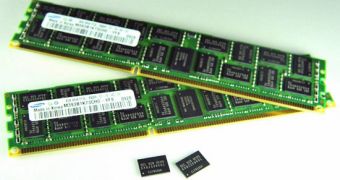Samsung Electronics, one of the world's leading vendors of consumer electronics and computer components, has recently announced the debut of a new marketing campaign that is intended to promote its 40nm-based 2Gb DDR3 chips. The campaign, which has been titled “Green Memory,” is focused on providing details on the energy-saving advantages that are delivered by the 40nm DRAMs, which have been designed to work at voltages of 1.35V, compared with the 1.5V voltage enabled on the other JEDEC-approved DDR3.
“40nm-class DDR3 DRAM achieves a 1.35V usage level, which is only a quarter of the energy used by 60nm-class DRAM, the mainstream product in the DRAM market today. It provides a single solution to the growing demand for servers to host larger volumes and achieve higher efficiencies,” Dongsoo Jun, executive vice president, Memory Sales and Marketing, Samsung Electronics, said. “40nm-class DDR3 DRAM will not only provide a solution for servers, but will extend to the entire IT marketplace to reach the end consumer and provide many benefits such as maintenance cost reductions.”
With almost all of the computer industry gearing up to provide some of the latest technologies that can offer customers greener, more energy-efficient computer products, Samsung's initiative appears to be rather justifiable. The company's “Green Memory” solutions can put forth for users an increased performance in a package that consumes less power, all thanks to the adoption of the new 40nm process technology that has been used on the development of these memory modules.
At this time, the Samsung 40nm 2Gb DDR3 DRAM is being used for 4GB SO-DIMM and UDIMMs, but is also available in 8GB and 16GB registered DIMMs. The 40nm 2Gb DDR3 DRAM has been in production since earlier this year, in July, when the company announced the start of the mass-production process.

 14 DAY TRIAL //
14 DAY TRIAL //